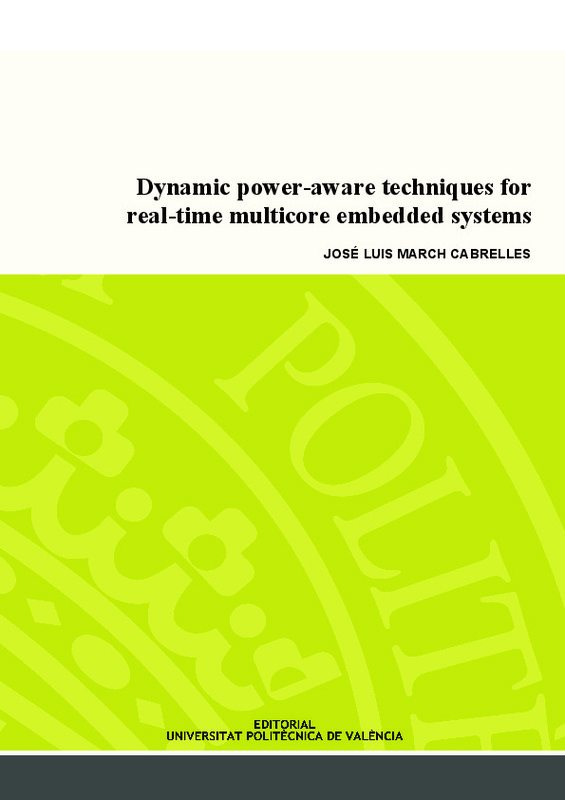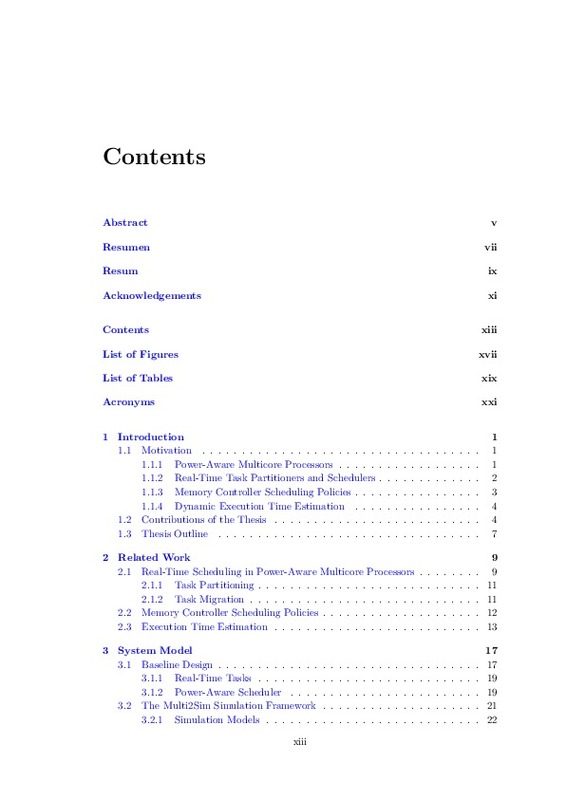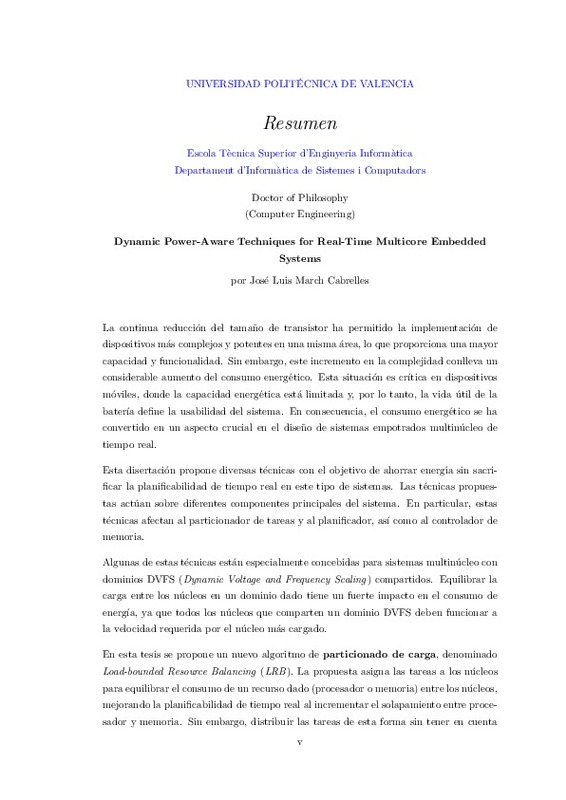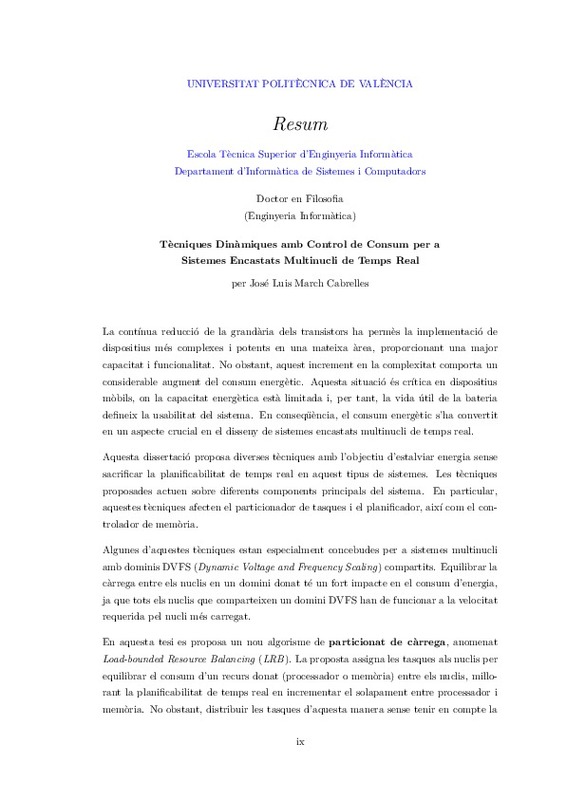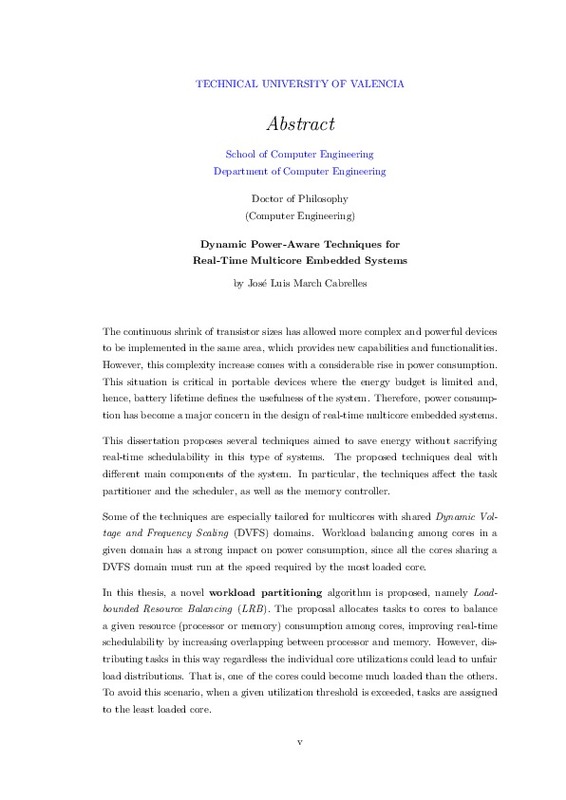- RiuNet repositorio UPV
- :
- Investigación
- :
- Tesis doctorales
- :
- Ver ítem
JavaScript is disabled for your browser. Some features of this site may not work without it.
Buscar en RiuNet
Listar
Mi cuenta
Estadísticas
Ayuda RiuNet
Admin. UPV
Dynamic Power-Aware Techniques for Real-Time Multicore Embedded Systems
Mostrar el registro sencillo del ítem
Ficheros en el ítem
| dc.contributor.advisor | Petit Martí, Salvador Vicente
|
es_ES |
| dc.contributor.advisor | Sahuquillo Borrás, Julio
|
es_ES |
| dc.contributor.author | March Cabrelles, José Luis
|
es_ES |
| dc.date.accessioned | 2015-03-30T11:14:56Z | |
| dc.date.available | 2015-03-30T11:14:56Z | |
| dc.date.created | 2014-12-15 | es_ES |
| dc.date.issued | 2015-03-30 | es_ES |
| dc.identifier.isbn | 978-84-9048-327-5 | |
| dc.identifier.uri | http://hdl.handle.net/10251/48464 | |
| dc.description.abstract | The continuous shrink of transistor sizes has allowed more complex and powerful devices to be implemented in the same area, which provides new capabilities and functionalities. However, this complexity increase comes with a considerable rise in power consumption. This situation is critical in portable devices where the energy budget is limited and, hence, battery lifetime defines the usefulness of the system. Therefore, power consumption has become a major concern in the design of real-time multicore embedded systems. This dissertation proposes several techniques aimed to save energy without sacrifying real-time schedulability in this type of systems. The proposed techniques deal with different main components of the system. In particular, the techniques affect the task partitioner and the scheduler, as well as the memory controller. Some of the techniques are especially tailored for multicores with shared Dynamic Voltage and Frequency Scaling (DVFS) domains. Workload balancing among cores in a given domain has a strong impact on power consumption, since all the cores sharing a DVFS domain must run at the speed required by the most loaded core. In this thesis, a novel workload partitioning algorithm is proposed, namely Loadbounded Resource Balancing (LRB). The proposal allocates tasks to cores to balance a given resource (processor or memory) consumption among cores, improving real-time schedulability by increasing overlapping between processor and memory. However, distributing tasks in this way regardless the individual core utilizations could lead to unfair load distributions. That is, one of the cores could become much loaded than the others. To avoid this scenario, when a given utilization threshold is exceeded, tasks are assigned to the least loaded core. Unfortunately, workload partitioning alone is sometimes not able to achieve a good workload balance among cores. Therefore, this work also explores novel task migration approaches. Two task migration heuristics are proposed. The first heuristic, referred to as Single Option Migration (SOM ), attempts to perform only one migration when the workload changes to improve utilization balance. Three variants of the SOM algorithm have been devised, depending on the point of time the migration attempt is performed: when a task arrives to the system (SOMin), when a task leaves the system (SOMout), and in both cases (SOMin−out). The second heuristic, referred to as Multiple Option Migration (MOM ) explores an additional alternative workload partitioning before performing the migration attempt. Regarding the memory controller, memory controller scheduling policies are devised. Conventional policies used in Non Real-Time (NRT) systems are not appropriate for systems providing support for both Hard Real-Time (HRT) and Soft Real-Time (SRT) tasks. Those policies can introduce variability in the latencies of the memory requests and, hence, cause an HRT deadline miss that could lead to a critical failure of the real-time system. To deal with this drawback, a simple policy, referred to as HR- first, which prioritizes requests of HRT tasks, is proposed. In addition, a more advanced approach, namely ATR-first, is presented. ATR-first prioritizes only those requests of HRT tasks that are necessary to ensure real-time schedulability, improving the Quality of Service (QoS) of SRT tasks. Finally, this thesis also tackles dynamic execution time estimation. The accuracy of this estimation is important to avoid deadline misses of HRT tasks but also to increase QoS in SRT systems. Besides, it can also help to improve the schedulability of the systems and reduce power consumption. The Processor-Memory (Proc-Mem) model, that dynamically predicts the execution time of real-time application for each frequency level, is proposed. This model measures at the first hyperperiod, making use of Performance Monitoring Counters (PMCs) at run-time, the portion of time that each core is performing computation (CPU ), waiting for memory (MEM ), or both (OVERLAP). This information will be used to estimate the execution time at any other working frequency | en_EN |
| dc.language | Inglés | es_ES |
| dc.publisher | Editorial Universitat Politècnica de València | |
| dc.rights | Reserva de todos los derechos | es_ES |
| dc.subject | Power Consumption | es_ES |
| dc.subject | Multicore | es_ES |
| dc.subject | Real-Time | es_ES |
| dc.subject | Embedded Systems | es_ES |
| dc.subject | Workload Partitioning | es_ES |
| dc.subject | Task Scheduling | es_ES |
| dc.subject.classification | ARQUITECTURA Y TECNOLOGIA DE COMPUTADORES | es_ES |
| dc.title | Dynamic Power-Aware Techniques for Real-Time Multicore Embedded Systems | es_ES |
| dc.type | Tesis doctoral | es_ES |
| dc.identifier.doi | 10.4995/Thesis/10251/48464 | es_ES |
| dc.rights.accessRights | Abierto | es_ES |
| dc.contributor.affiliation | Universitat Politècnica de València. Departamento de Informática de Sistemas y Computadores - Departament d'Informàtica de Sistemes i Computadors | es_ES |
| dc.description.bibliographicCitation | March Cabrelles, JL. (2014). Dynamic Power-Aware Techniques for Real-Time Multicore Embedded Systems [Tesis doctoral]. Editorial Universitat Politècnica de València. https://doi.org/10.4995/Thesis/10251/48464 | es_ES |
| dc.description.accrualMethod | TESIS | es_ES |
| dc.type.version | info:eu-repo/semantics/publishedVersion | es_ES |
| dc.relation.pasarela | TESIS\6707 | es_ES |
Este ítem aparece en la(s) siguiente(s) colección(ones)
-
Tesis. Editorial UPV [172]
-
Tesis doctorales [5389]






